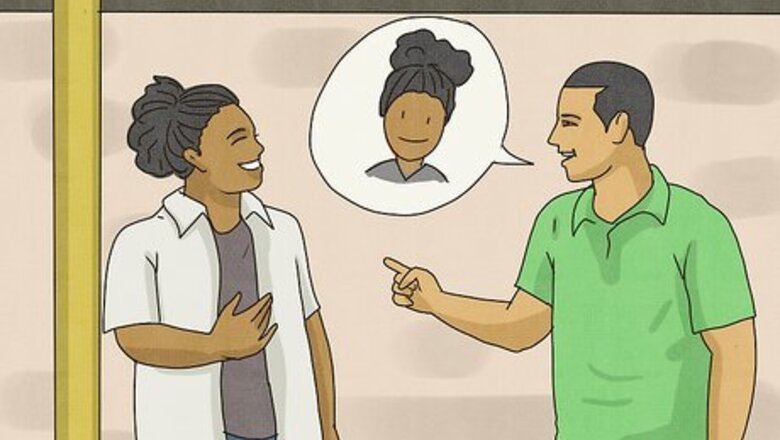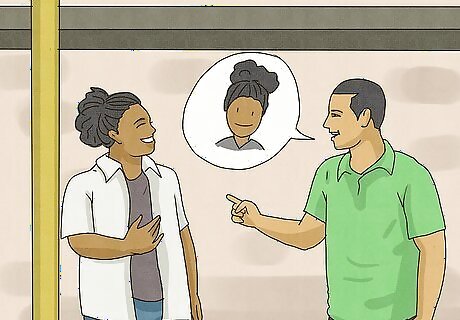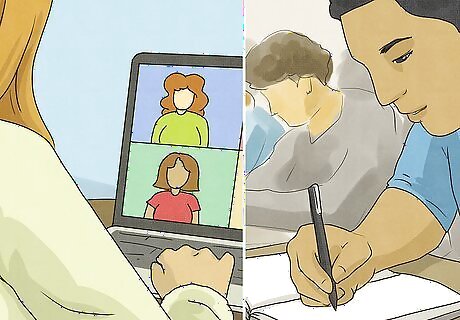
views
Compliment someone.

Compliments are a great way to break the ice with a stranger. Take a quick look to make sure the person isn’t busy or in a hurry. Then, say hello and offer a compliment. Keep the conversation going by sharing simple insights and asking questions. A friendly conversation with a stranger is an easy way to give your social skills a boost. You could say “I love your coat” or “I really like the way you style your hair.”
Join a class or club.

Clubs, classes, and teams are great ways to meet like-minded people. Strike up a conversation with someone sitting near you; if you really hit it off, you might make a friend in the process! A fun, social environment is a great training ground where you can improve your social skills. A simple question or friendly statement can be enough to break the ice. You might say, “It’s so nice to see so many people here” or “What brings you here?” If there aren't any local clubs that interest you, consider joining a virtual group, like an online book club.
Commit names to memory.

Social skills are rooted in social connections. Whenever you meet a new person, try to memorize their name after they introduce themselves. It’s okay if you don’t remember right away—just ask them to repeat themselves. Calling people by name is a great way to set yourself apart in a conversation. If you forget someone’s name, you can always ask a friend or co-worker to refresh your memory.
Choose general conversation topics.

Broad topics can lead to great conversations. Instead of forcing an awkward conversation, just talk about something general, like the weather, or make an observation about what’s going on around you. Having good social skills is all about keeping things light and going with the flow. A simple comment like, “I can’t wait for this cold front to leave” is a great conversation starter.
Talk about positive things.

Negativity and complaints can be big turn-offs in a conversation. Make a more positive impression by picking cheerful and upbeat topics to discuss, instead of complaining or making negative comments. Positivity is a sure-fire way to make a good impression on the people around you! Instead of complaining about the weather or something else negative, comment on something positive that’s happened to you this week. You might talk about a cute video you watched or something interesting you saw on social media.
Look attentive by leaning forward and keeping your head up.

Good posture helps you look interested and engaged. Uncross your arms, so you seem welcoming and open throughout the conversation. Try not to slouch or tilt your head down; when you stand up straight, you look invested in what the other person has to say. Because of this, using good posture is a great way to boost your social skills. For instance, if you stare at the ground with your back hunched, you won’t seem very interested in the conversation. Posture may not seem important in the moment, but it makes a difference in the long run! Looking engaged and invested really improves your social skills in future conversations.
Listen to the people around you.

Healthy conversations involve a lot of give and take. It’s important to be open and vocal in a conversation, but you don’t want to dominate the dialogue, either. Listen for openings where you can ask relevant, insightful questions throughout the conversation. Being an active, attentive listener is a key part of good social skills! Ask people open-ended questions. “What are your plans for the weekend?” will help keep a conversation going, while “Are you excited for the week to be over?” won’t.
Speak confidently in a group.

Look for opportunities to speak during a conversation. As the chat continues on, listen for an opening where you can jump into the conversation. Talk loudly and authoritatively, so other people in the conversation will pause and listen to you. For instance, if you and some friends are talking about summer vacation, you might share a fun experience you had during the past summer. If some co-workers are complaining about the weather, you might share what you heard on the latest weather report. Group conversations can be pretty chaotic, and even the most seasoned conversationalist can have trouble getting a word in. It’s okay if you have some difficulty at first!
End conversations gracefully.

It’s okay if you can’t think of anything else to say. Simply mention something else you have to do, and that you’ll have to step away. Thank the person for their time, and let them know that you’d like to talk again some other time. Believe it or not, ending a conversation properly is just as important as starting or maintaining one. You might say something like, “I have to go to class, but it was great talking to you! Want to grab coffee sometime?”
Follow up in a future conversation.

Rehash stories and facts about someone in a future conversation. Remembering tidbits about someone’s life can really set you apart from the crowd. Take mental notes whenever you’re chatting with someone. The next time you meet up, reference something that they mentioned in a previous conversation. They’ll really appreciate your consideration and attention to detail! You might say something like, “Did your daughter Emily make the softball team?” or “How was your vacation in Florida?”
Practice standing up for yourself.

Being assertive doesn’t make you selfish or awkward. It’s perfectly okay to have your own thoughts and opinions! Practice saying “no” in a confident tone of voice, and standing up straight. If you’re having some trouble working up your confidence, ask a friend if you can practice speaking assertively to them. Standing up for yourself and what you believe in is a valuable social skill.
Read a classic literature novel.

Research shows that reading increases emotional intelligence. In the study, participants were asked to read short passages from classic fiction books. Then, the participants were tested on their empathy, emotional intelligence, and social perception. After reading the classic story excerpts, the test-takers actually scored higher in these categories. If you have some free time of your own, stop by your local library and pick up a classic read, like one of Anton Chekhov’s or Alice Munro’s works. Your social skills may improve naturally this way! Classic literature can help improve your social skills more than modern novels, like works by Danielle Steel.




















Comments
0 comment